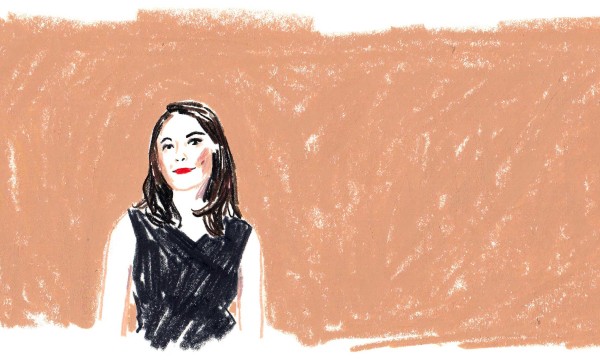Sarah LaFleur on the Connection Between Parental Leave and Equal Pay
April 15, 2018 | Filed in: Humans of MM
Last Tuesday was Equal Pay Day, a “holiday” that is important to us here at MM. We know that the fight to achieve salary parity is complicated; it isn’t as simple as just paying men and women the same amount for equal work. Below, our CEO explains her belief on how equal maternity and paternity leave policies are a crucial step towards achieving equal pay.
I still remember the day my business partner, Annie, told me she was pregnant. It was February 2014, and MM.LaFleur was still in a nascent stage—every month was touch-and-go. Every single person mattered, we were working around the clock, and even taking vacation could cause disruption. And, to make it as a real for you as possible: Our corporate bank account had just gone to zero. Annie was also a close friend, so my initial reaction was joy. My second reaction was: How on earth are we going to survive without her?
I want to get one thing out of the way, and that is the notion that there is somehow a “more convenient” or “less convenient” time to have a baby. Getting pregnant, I’ve learned, is not something that most of us can time. As I’ve grown older, I’ve seen my friends and colleagues go through various fertility journeys. Some unexpectedly got pregnant on their first try; for others, it took months, if not years. There seems to be a misconception in the corporate world that one can magically time their pregnancy around their partner promotion or their residency, and it’s complete BS. That’s just not how our bodies work.
When she got pregnant, Annie was every bit as invested in the success of MM as I was, so we decided we’d go on this “maternity leave policy” journey together. She was the first pregnant employee in MM history, so we began to research what other early-stage companies do. I remember googling terms like “startup, maternity leave,” and coming up with absolutely nothing. (To my delight, googling the same phrase today, I’ve discovered there are many more articles on the topic, all written in 2015 and after.)
The only official guide I could find was from New York State, which said there was no requirements for a company of our size. Workers at companies with more than 50 employees were entitled to take up to 12 weeks of unpaid leave, but for companies with fewer than 50 employees, there was no obligation to offer anything, paid or unpaid. This seemed absurd.
On the other end of the spectrum were industry leaders like Google and Facebook, who were offering 16 to 20 weeks, fully paid. This sounded great in theory, but also financially irresponsible for a company with our bank account. It was a dilemma: how do we set an example for how employers should handle parental leave, while also being responsible business owners?
Ultimately, we landed on 12 weeks. By American standards, and especially by early-stage start-up standards, this was generous. Then again, we were building a company that supports professional women. If we didn’t stand up for a decent maternity leave, who would?
When Annie had her baby, our seven-person team pulled together and stretched ourselves. Eleanor, who was less than nine months out of college, started running our digital marketing. Michaella, who ran our customer experience, started managing our email marketing. Annie also checked in every now and then throughout her leave, and spoke on a panel four weeks after giving birth. Was it hard? Of course. But it was an important moment for us to model how we would want to be treated.
Since then, we’ve hired (gasp) men. One of the most important decisions I’ve made as CEO is to offer 12-week parental leave for men and women. Why is this important? Because it renders every candidate equal. As a business owner, it’s tempting to think, “I’m going to go with the person who isn’t going to disappear for 12 weeks” if they have a child. Offering 12 weeks for both genders is one way of leveling the playing field.
Our CFO, Michiel, had a baby 15 months ago. And he didn’t take the 12 weeks all in the beginning, but ended up spreading it out over the first nine months, finding the balance that worked for him. One of my proudest moments as a company was when we hired our Director of Production when she was eight months pregnant. She went on maternity leave three weeks after she started (the baby came early! Again, you can’t time these things…), and came back 12 weeks after. She’s one of our star employees, and continues to be a role model for other parents and parents-to-be at the company.
It’s tempting to think that there’s a one-size-fits-all policy for parental leave, but companies are all in different stages with different financial circumstances. The onus is on the employer to be transparent about company needs, acknowledge employee needs, and work together to find that elusive “balance” that allows every person to feel fulfilled.
Today, in addition to our parental leave policies, we’re proud to partner with a company called LUCY that helps support our employees through the adventure of new parenthood. LUCY offers a dedicated guide, in-home expert support, online workshops, birth preparation, newborn care, breastfeeding support, and more.
Historically, women have paid a professional price during their childbearing years that ends up taking a toll on their entire careers. If they take a step back to have and raise children, they don’t just sacrifice short-term income. They also end up slowing their growth trajectories—promotions and raises are harder to come by after you’ve “slowed down” to have children. And this is just one of the many things that leads to the pervasive pay gap we see between genders.
It’s important to me that none of my employees pay this kind of price when they become parents. Equality is something we need to fight for at every step of the career journey. Annie’s pregnancy in 2014 was an important wakeup call for me, but it was just the beginning. We’re still learning as we try to build a workplace where our employees don’t just survive—they thrive.








